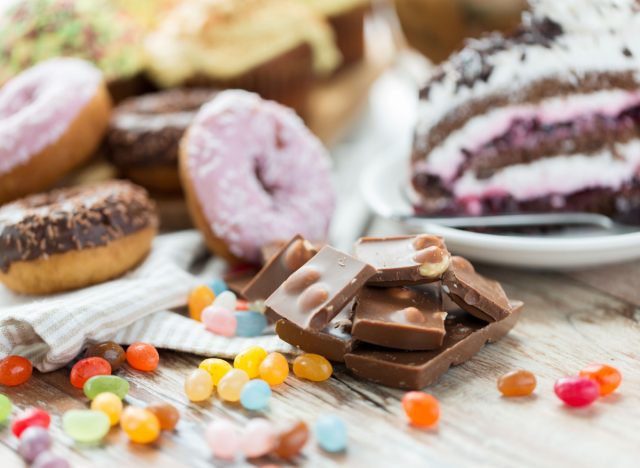Can you be addicted to sugar—or is something else going on? The idea of sugar addiction has been the subject of many media headlines, and is often categorized among other "abnormal behaviors around food" akin to eating disorders by organizations like Overeaters Anonymous. But does sugar addiction truly exist? We interviewed three dietitians to get the scoop.
Defined as "an emotional or psychological dependence on sugary foods and drinks," the general consensus seems to be that sugar addiction—in the truest, most literal interpretation of the term—may not exist. In fact, some addiction experts agree that there are neurobiological differences between a dependence on a substance versus a compulsion that centers around something you need for survival, like food.
According to the American Psychology Association,"Food addiction is a controversial term used by some researchers to describe parallels between the difficulties some people experience in limiting eating and substance addiction. Unlike in addiction however, where an individual is addicted to one particular class of drug, it is difficult to identify one food that underlies 'food addiction.' Similarly, the withdrawal syndrome caused by dependence on a drug of abuse is hard to demonstrate in overeaters. Despite the similarities between eating disorders and substance abuse, and evidence of the involvement of brain reward circuits in both conditions, the neurobiology of binge eating and of drug addiction are not the same"
At the same time, other studies in animals have shown that sugar intake can mirror addiction behavior—but that does not necessarily mean that sugar is addictive in humans.
Here's what the experts say about sugar addiction, and what to do if you think you may be addicted to sugar.
Can you be addicted to sugar?

"The debate is still out on if sugar is truly physically addicting. Some research has shown rats behave similarly when exposed to sugar as when they are exposed to addictive drugs like opioids, but these reactions may be more behavioral rather than physical," Melissa Mitri, RD, explains with regard to current research on sugar addiction. "This could mean that some people may be more prone to crave sugar than others just like some people are more likely to become addicted to other activities, like gambling."
"More human studies are needed to confirm the ability of sugar to be physically addictive," Mitri shares.
Furthermore, we know that not everyone has a taste preference for sweet stuff.
"Sugar intake is partly determined by our sweet taste preference and cravings for certain foods and beverages and also by our genetics. People who carry the glucose transporter type 2 (GLUT2) variant seem to have greater preference for sweet foods and higher sugar intake," Karolin Saweres, RDN, tells Eat This, Not That!
Why do you feel addicted to sugar?
There are both physical and psychological reasons for feeling addicted to sugar. Physically, you may not be eating enough total food in your day, so your cravings for sugar feel powerful and intensify because your body signaling that it needs energy fast.
"You could also be waiting too long to eat or not eating enough throughout the day, so your blood sugar is low," Mitri says. "This can increase the desire for sugar to provide energy and bring your blood sugar back up."
Psychological reasons for feeling addicted to sweets are more complex.
"You may feel addicted to sugar for several reasons. It may have become a habit and your body is conditioned to crave it," Mitri adds. "You can also crave sugar more often if you're stressed or lacking sleep, as these two things increase your hunger hormones, making these cravings feel harder to control."
"There are pleasure-generating signals in the brain given off in response to eating or drinking something sweet," Saweres says. These pleasure signals offer a reward that might reinforce eating sweets again and again.
How to feel more in control around sugary foods

Your sugar cravings and eating habits could be your way of trying to fulfill or compensate for an emotional need as opposed to responding to a physical cue. For example, many people reach for sugar when they are tired, angry, sad, or bored. Identifying what was going on leading up to the urge to eat something sweet can be a powerful exercise.
"Look closely at what you are addicted to […] When we learn the specific thing that triggers our craving for sugar, we can learn about how to control it. I prefer to delve deeper and figure out the triggers," Abigail Thomas, RD, advises.
Mitri and Saweres agree that you should eat balanced meals regularly, and avoid skipping meals.
"Eating enough protein, fiber, and whole grains with each meal can keep your blood sugar levels steady and curb sugar cravings. Manage stress on a regular basis through exercise, self-care, and meditation," Mitri suggests.
"Try keeping foods high in sugar out of the house," Saweres says. "If you are used to having something sweet as a reward, try practicing having non-food rewards; such as a massage, facial, pedicure, shopping, or saving money for travel and trips."